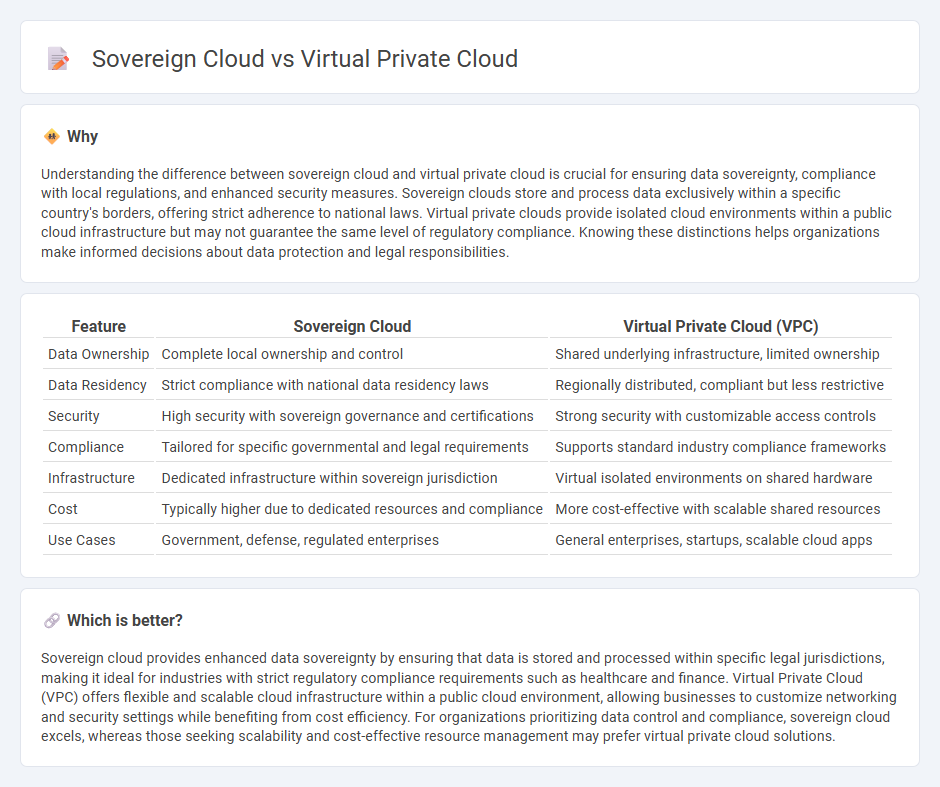
Sovereign cloud ensures data residency and compliance by hosting services within specific national borders, offering enhanced control for government and regulated industries. In contrast, virtual private cloud provides isolated environments within a shared public cloud infrastructure, balancing scalability with security for businesses. Explore the key differences and benefits of sovereign and virtual private clouds to optimize your cloud strategy.
Why it is important
Understanding the difference between sovereign cloud and virtual private cloud is crucial for ensuring data sovereignty, compliance with local regulations, and enhanced security measures. Sovereign clouds store and process data exclusively within a specific country's borders, offering strict adherence to national laws. Virtual private clouds provide isolated cloud environments within a public cloud infrastructure but may not guarantee the same level of regulatory compliance. Knowing these distinctions helps organizations make informed decisions about data protection and legal responsibilities.
Comparison Table
| Feature | Sovereign Cloud | Virtual Private Cloud (VPC) |
|---|---|---|
| Data Ownership | Complete local ownership and control | Shared underlying infrastructure, limited ownership |
| Data Residency | Strict compliance with national data residency laws | Regionally distributed, compliant but less restrictive |
| Security | High security with sovereign governance and certifications | Strong security with customizable access controls |
| Compliance | Tailored for specific governmental and legal requirements | Supports standard industry compliance frameworks |
| Infrastructure | Dedicated infrastructure within sovereign jurisdiction | Virtual isolated environments on shared hardware |
| Cost | Typically higher due to dedicated resources and compliance | More cost-effective with scalable shared resources |
| Use Cases | Government, defense, regulated enterprises | General enterprises, startups, scalable cloud apps |
Which is better?
Sovereign cloud provides enhanced data sovereignty by ensuring that data is stored and processed within specific legal jurisdictions, making it ideal for industries with strict regulatory compliance requirements such as healthcare and finance. Virtual Private Cloud (VPC) offers flexible and scalable cloud infrastructure within a public cloud environment, allowing businesses to customize networking and security settings while benefiting from cost efficiency. For organizations prioritizing data control and compliance, sovereign cloud excels, whereas those seeking scalability and cost-effective resource management may prefer virtual private cloud solutions.
Connection
Sovereign cloud and virtual private cloud (VPC) are interconnected through their emphasis on data sovereignty and secure, isolated cloud environments. Sovereign clouds ensure compliance with local data protection laws by controlling data residency, while VPCs provide logically isolated segments within a public cloud, enhancing security and privacy. Together, they enable organizations to maintain strict governance over sensitive data while leveraging scalable cloud infrastructure.
Key Terms
Isolation
Virtual Private Cloud (VPC) offers logical isolation within a shared cloud infrastructure, ensuring dedicated resources and segmented networks for each tenant to enhance security and control. Sovereign cloud emphasizes data sovereignty and compliance by physically isolating data within specific jurisdictions, often using dedicated facilities and strict regulatory controls to protect sensitive information. Explore the features and benefits of both cloud models to determine the best fit for your organization's isolation and security needs.
Data Residency
Virtual Private Cloud (VPC) offers isolated cloud resources within a public cloud infrastructure, allowing data residency control through regional data centers. Sovereign Cloud emphasizes strict compliance with local data sovereignty laws, ensuring data is stored and processed exclusively within national borders, often under specific legal frameworks. Explore how choosing between VPC and Sovereign Cloud impacts your organization's data residency strategies and regulatory compliance.
Compliance
Virtual Private Cloud (VPC) provides isolated cloud resources within a public cloud infrastructure, ensuring data segmentation and customizable security controls that comply with general industry standards such as GDPR and HIPAA. Sovereign Cloud emphasizes strict adherence to national or regional data sovereignty laws, enabling organizations to meet compliance requirements by keeping data within specified geographic boundaries and under local jurisdiction control. Explore more to understand how each cloud model can support your organization's compliance strategy.
Source and External Links
What Is a Virtual Private Cloud (VPC)? - IBM - A virtual private cloud (VPC) is a public cloud offering that lets an enterprise create a logically isolated, private cloud-like environment on shared public cloud infrastructure.
Virtual private cloud - Wikipedia - A virtual private cloud is an on-demand, configurable pool of shared resources within a public cloud, providing isolation between organizations through private IP subnets and virtual networking.
What is a virtual private cloud (VPC)? - Cloudflare - A virtual private cloud is a secure, isolated private cloud hosted within a public cloud, allowing customers to perform the same functions as in a private cloud while leveraging public cloud scalability and convenience.
 dowidth.com
dowidth.com